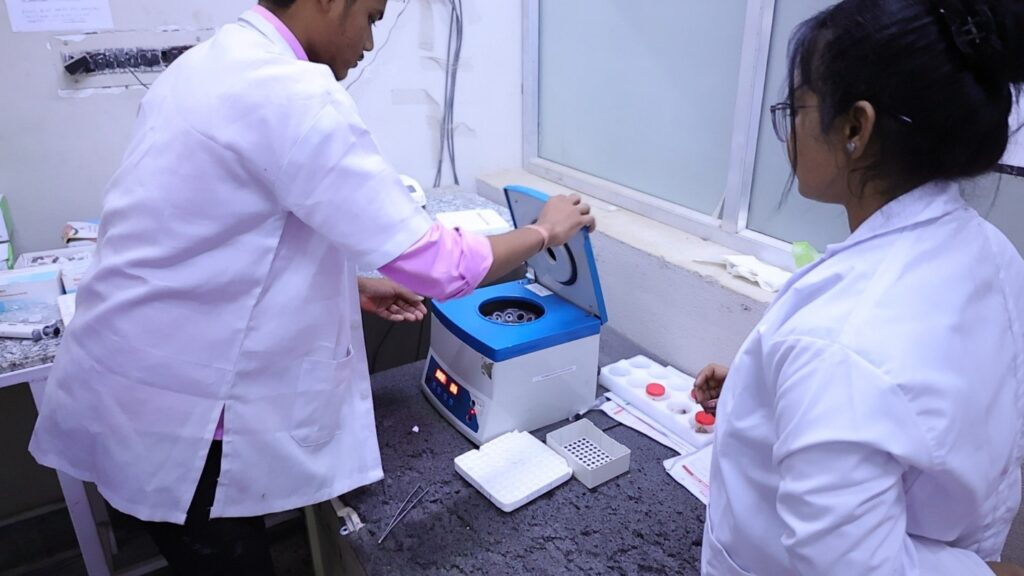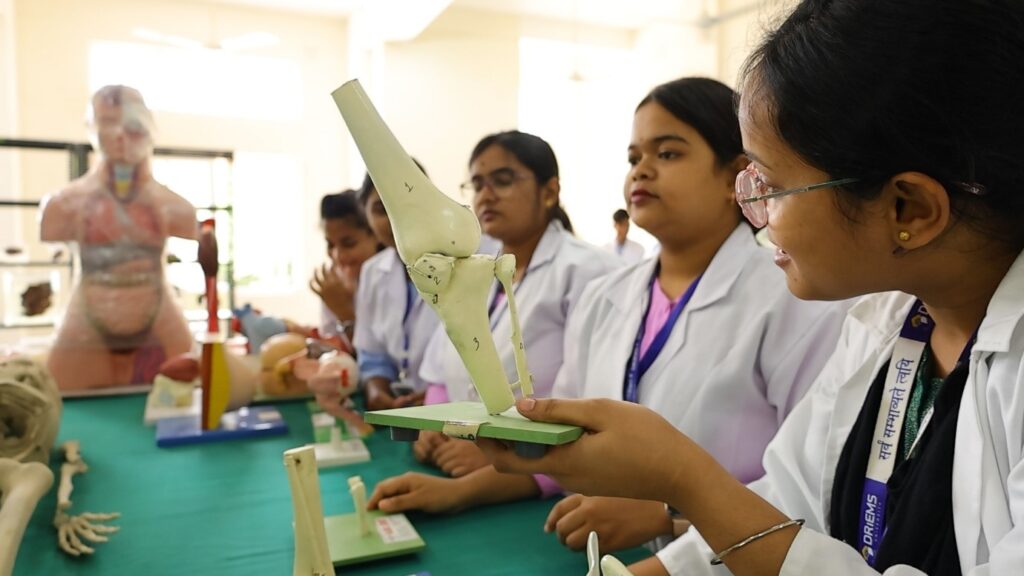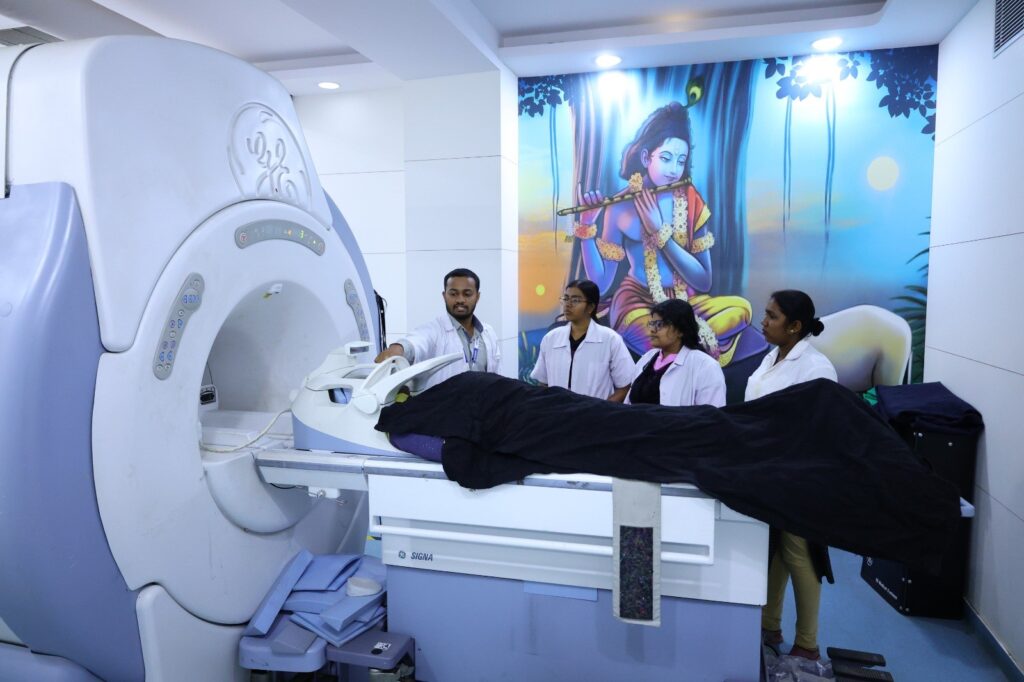School of Paramedical and Allied Sciences Lab
Staff
Mr. R. Panda
Lab Instructor
Email: ram.panda@driems.ac.in
PATHOLOGY LAB
Our state-of-the-art laboratory offers comprehensive services in Clinical Pathology, Hematology, Blood Banking, and Immunopathology. Equipped with advanced diagnostic technology, we provide accurate and timely analysis of blood, body fluids, and tissue samples to support effective patient care. Our Hematology department specializes in the evaluation of blood disorders, including anemia, leukemia, and clotting abnormalities. The Blood Bank ensures a safe and reliable supply of blood and blood components, adhering to stringent screening and storage protocols. Our expert team of pathologists and technologists is committed to delivering high-quality, reliable results with a focus on patient safety and clinical excellence.

Clinical Pathology Laboratory

Our Clinical Pathology Laboratory provides a wide range of diagnostic services focused on the analysis of blood, urine, stool, and other body fluids. With a commitment to accuracy and efficiency, we support clinicians in diagnosing and monitoring a variety of health conditions. The lab is equipped with cutting-edge analyzers and staffed by experienced pathologists and technicians to ensure timely and reliable results.
Hematology Laboratory
The Hematology Laboratory specializes in the study of blood and blood-forming tissues. We conduct detailed investigations of red and white blood cells, platelets, hemoglobin levels, and clotting factors to diagnose conditions such as anemia, leukemia, and other hematological disorders. Our advanced automated systems and expert interpretation ensure high precision in every test.

Blood Banking/immunohematology Laboratory

Our Blood Banking / immunopathology Laboratory is dedicated to the safe collection, processing, testing, and storage of blood and blood components. We follow stringent protocols to ensure compatibility and safety for transfusions. The lab also provides cross-matching, antibody screening, and Rh typing services to support emergency and elective transfusion needs.
ANATOMY & PHYSIOLOGY LAB
The anatomy and physiology lab is an essential component of paramedical and allied science education, providing students with a comprehensive understanding of human skeletal system and all other systems and its clinical applications. Anatomy and Physiology labs in Paramedical and Allied Sciences are essential for Understanding human body structures by providing a detailed understanding of the framework and different organs and their function in our body.
- Hands-on Learning
Hands-on Learning and Detailed understanding of human body structures provide Students to gain hands-on experience with dissection and exploration of human cadavers or models and help students to understand how body systems function.
- Research and Development:
Anatomy labs facilitate research on human anatomy, contributing to our understanding of the human body and informs the development of new treatments and surgical techniques. Physiology labs investigate how the human body functions, from molecular to systems level and study the underlying mechanisms of diseases, informing new treatments and therapies.
- Clinical Applications:
Anatomy labs help surgeons plan and practice complex procedures for interpreting medical images, such as X-rays, CT scans, and MRIs. Physiology labs contribute to the development of new treatments and therapies for various diseases to inform patient care and treatment decisions.
- Interdisciplinary Collaboration and Advancements:
Anatomy and physiology labs often incorporate advanced technologies, such as 3D printing and virtual reality, to enhance education and research and often collaborate with other scientific disciplines, such as biomechanics, genetics , nutrition , anthropology, forensic science, and sports science.



Microbiology Lab


The Microbiological Laboratory is a state-of-the-art facility dedicated to the exploration, analysis, and understanding of microorganisms and their roles in various environments. Equipped with modern instrumentation and designed to support a wide range of research and teaching activities, the lab serves students, faculty, and researchers across the life sciences.
The laboratory supports investigations in bacteriology, virology, mycology, and environmental microbiology. It includes designated areas for culturing microbes, DNA/RNA extraction, microbial identification, and antimicrobial susceptibility testing.
In addition to its research function, the lab plays a critical role in academic instruction, offering hands-on learning experiences that align with current industry and clinical standards. Students are trained in aseptic techniques, microbial culturing, microscopy, and molecular diagnostics, preparing them for careers in healthcare, biotechnology, environmental science, and academic research.
The Microbiological Laboratory is a hub of scientific inquiry and innovation, fostering collaboration, discovery, and the advancement of knowledge in the field of microbiology.
BIOCHEMISTRY LAB
A Biochemistry Lab plays a crucial role in Paramedical and Allied Health Sciences. It deals with various qualitative and quantitative analyses of major biomolecules such as proteins, Amino acids, Carbohydrates, Lipids, and Vitamins. Graduates design and implement experiments using modern laboratory equipment and techniques such as spectroscopy, chromatography, and electrophoresis. Additionally, graduates analyze and interpret experimental data, which is fundamental for deriving insights from biochemical research. Students convey their scientific ideas and discoveries clearly and persuasively, contributing to the broader dialogue within the scientific community and society at large.

CLINICAL BIOCHEMISTRY LAB

The Clinical Biochemistry laboratory is equipped with automated instruments, such as analyzer, which produces a large amount of numerical data. Students learn various clinical analysis such as liver function test, Renal function tests, Various thyroid hormones and CSF by from the collected sample from patients. The scope of this lab is to give proper diagnostic values related to various biochemical processes. The student will be able to understand about the details of the various aspects involved in smooth running of the lab and interpret biomedical data in the investigation and diagnosis of disease and discuss the origin and effects of an abnormal biochemical profile. The student will also understand how the clinical biochemistry laboratory helps effectively to meet the requirements of the end users by systematic communication between the clinician and laboratory persons.
CT (Computed Tomography)
– Uses X-rays to create detailed cross-sectional images of the body
– Helps diagnose conditions such as injuries, cancers, and vascular diseases
– Lab equipment includes CT scanners, computers, and image reconstruction software

MRI (Magnetic Resonance Imaging)

– Uses magnetic fields and radio waves to create detailed images of internal structures
– Excellent for imaging soft tissues, such as organs, tendons, and ligaments
– Lab equipment includes MRI scanners, computers, and image analysis software
X-ray
– Uses ionizing radiation to produce images of internal structures
– Often used for diagnosing bone fractures, lung conditions, and foreign objects
– Lab equipment includes X-ray machines, image receptors (film or digital), and radiation safety equipment.






